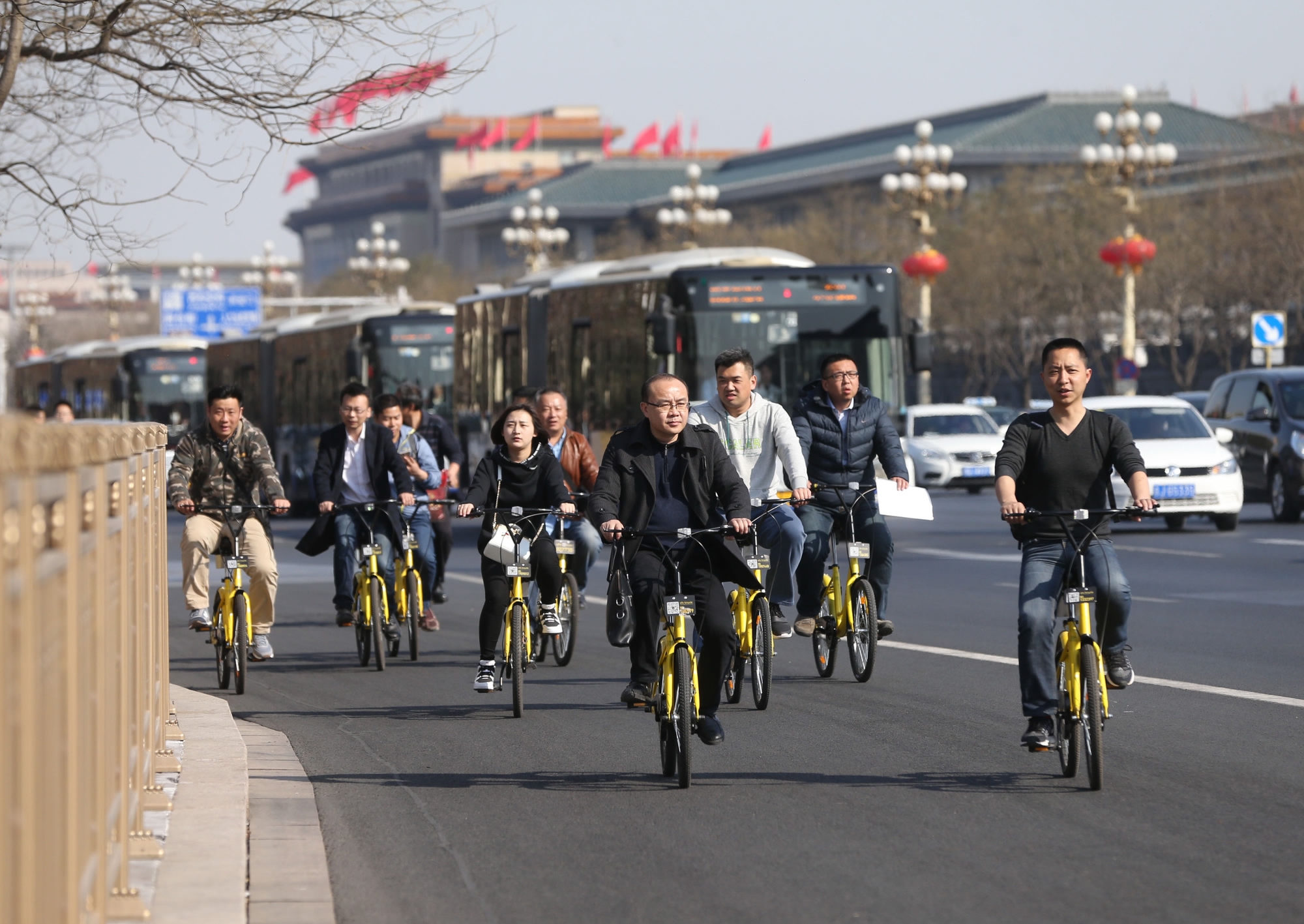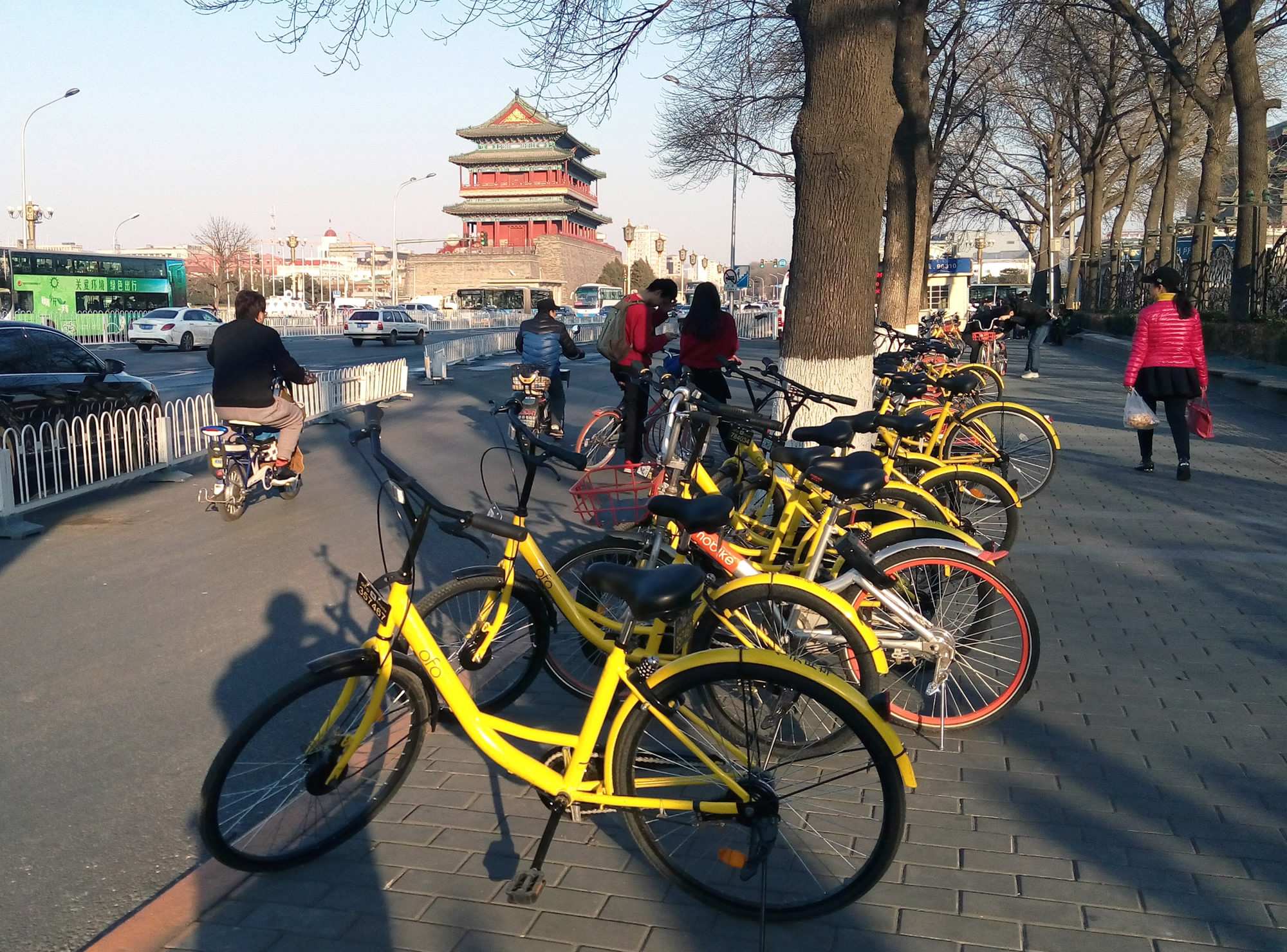Guest commentary by Jeffrey Towson
During the 2007 financial crisis, former Citigroup CEO Charles Prince famously said: “When the music stops, in terms of liquidity, things will be complicated. But as long as the music is playing, you’ve got to get up and dance.”
Looking at the bike-sharing business in China today, you see a lot of such dancing. You see a nice simple business model that has been deluged with hype and money.

The locals ride sharing bikes on the street of Beijing, capital of China on March 10, 2017. /CFP Photo
But most importantly, you also see a lot of very questionable, non-economic behavior that will probably end badly, especially for investors. For example:
1. Prices, increasingly subsidized by investors, remain very low and are almost certainly unprofitable, typically RMB 0.5-1 (7-14 US cents) per half hour.
2. Leading bike sharing companies such as Mobike and Ofo are now carpet bombing China with hundreds of thousands of bikes - despite the still serious questions about their business models’ profitability. This is a big change from when Ofo used to put cheap bikes on college campuses which are fairly controlled environments with clear demand and likely profitable pricing.
3. The bikes are getting fancier and likely more expensive. Mobike bicycles are reported to cost RMB 2,000 (290 US dollars) to manufacture for the regular version and RMB 600 (86 US dollars) for the ‘Lite’ version. Assuming an average usage per bike of eight times a day (a big assumption), it would still take about a year to recoup the production expense of a bike, not to mention maintenance, theft and vandalism charges. This is a big change from back when Ofo was deploying cheap bikes, probably costing RMB 150, on campuses.
4. Investment rounds are getting larger and more frequent. This business has morphed into a competition based mostly on capital. Already in 2017, Mobike has had two rounds of raising investments totaling around 300 million US dollars.
5. Competitors are continuing to enter the market. There are approximately 30 bike-sharing companies now operating in China - including Bluegogo, Ubike, Xiaoming Bike, Youon, Edaibu, and Qibei - with most founded in 2016. This business has low barriers to entry and this will create continued competitive pressure on already likely razor-thin, if not negative, operating margins.
Across the board, what we are seeing is non-economic behavior and a race for scale that is fueled by hype and enabled by easy access to money to invest. This is warping and distorting what is an ultimately very nice and popular consumer bicycle rental service. But the ‘music is playing’ and all the companies ‘have to dance’ - or leave the market. This is likely to end badly for everyone, except for the consumers and bike thieves.
The biggest part of this problem is the drive for scale. The leading companies are all trying to get big and capture market share, with Mobike reportedly having over 70 percent of the China market, measured both by the number of bikes and number of rides taken.
However, the problem with this is there doesn’t appear to be any big advantages to scale. It doesn’t create a superior service like in taxi ride-sharing (more drivers means shorter waiting times). It doesn’t get a network effect. It doesn’t create a much lower cost structure per unit. And it ultimately doesn’t stop any small company from spending RMB 200,000 and deploying 1,000 bikes in a particular neighborhood.
This business model followed by so many bicycle-sharing companies just doesn’t appear (yet) to have any competitive advantage. The market may well consolidate, but there is no reason yet to think the business itself will generate any type of exceptional profitability. The race for scale looks more like a race for a big sale or IPO.

Sharing bikes on the street of Beijing, capital of China on March 10, 2017. /CFP Photo
The other part of the problem is the hype and confusion between bicycle-sharing and ride-sharing. Here are a couple of things to keep in mind.
1. This is not a ride-sharing platform like Uber or Didi. It is not a two-sided platform with big competitive strengths and attractive software-type economics. There is no network effect. This is a traditional bicycle rental business with an app.
2. There is no significant asset-sharing going on, like with Airbnb. This is not part of the sharing economy where companies piggyback other people’s assets (Airbnb does not own a single hotel room but uses other people’s “spare rooms”). When Mobike founder and CTO Joe Xia claims “Mobike is indeed part of the sharing economy,” pay attention to his next sentence where he says: “first, I think we need to to rethink the concept of sharing economy.” And let’s not pick on Mobike, as Ofo has also tried to claim it is sharing because people can register their own bikes on the service and have them painted yellow. That is also not sharing a significant asset. That is called the company accepting used products. DVD shops do this every day.
3. This is also not the Internet of Things, big data or a technology company. Yes, bicycle sharing has some hardware and software – but so do banks, hospitals and retail stores.
4. This is not a disruptive technology, such as with self-driving cars.
There has been a remarkable amount of hype about this business. Why is this happening in bike-sharing and not in other mobile apps? My own pet theory is that the brightly colored bikes are catchy to the eye and happen to be concentrated in the central business districts of Shanghai, Shenzhen and Beijing – exactly where investors and journalists spend their days.
That said, none of this means that this isn’t a nice, cool service. “As-needed bicycle rentals” is a great idea. But this cool and popular business is now being drowned out by the hype and money. Watch for the government to get involved shortly.
(Jeffrey Towson is a professor of investment at Peking University Guanghua School of Management. The article reflects the author’s opinion, not necessarily the view of CGTN.)









